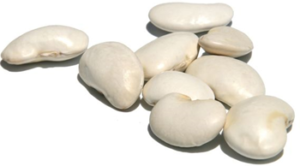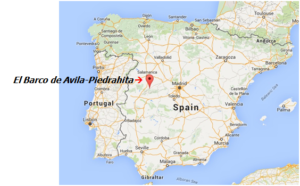Sara Brings Back A Recipe From Spain.
Judion beans (or Judiones — pronounced you day OWN ess — in Spanish, and see image below)

are grown only in the fertile soil of El Barco de Avila-Piedrahita in Avila, Spain. El Barco de Avila-Piedrahita translates in English to “The Boat of Despair in the Middle of Nowhere.” The word Judio in Spanish means Jewish, but despite the fact that all Spanish Jews were persecuted and tortured for a century and a half before being forced to leave Spain in 1492 — under the Alhambra Decree — and any remaining Jews thereafter were persecuted and tortured under the waning days of the Spanish Inquisition, Judiones are beloved by all non-Jewish Spaniards.
The city of Avila is located west of Spain’s capital, Madrid, and just south of Salamanca, a Spanish city of Celtic origin. Avila’s sister city in the United States is nearby Far Rockaway, Queens, despite the fact that there is no fertile soil and few people of Spanish origin on The Rockaway Peninsula. Go figure.

Judiones are referred to in Spain as the Queen of Beans, presumably because of their size, and are labor-intensive to grow. They are valued for their characteristic thin skins (much like that of former Spanish dictator Generalissimo Francisco Franco), their creamy texture, and their unique flavor (again, much like that of former Spanish dictator Generalissimo Francisco Franco).
Typical Spanish dish with Judiones
(serves 3 as a main course)
1 cup Judiones
½ medium onion, chopped
2 cloves garlic
¼ tsp Spanish paprika
¼ cup olive oil
8½ cups water
½ red or green pepper, cut into long strips
½ tsp salt (only after cooking is completed)
Soak beans in water overnight.
On a stovetop, heat a shallow clay dish using medium heat (I don’t have a clay dish so I used a sauce pan). Add oil, then garlic, onion, pepper and paprika. Cook slowly for five minutes, and then remove from heat.
Rinse beans and add beans to 8½ cups of water in a medium pot. Bring to a boil, then lower to medium heat and cook for 30 minutes.
Add beans.
Medium heat for one hour or until beans are tender.
Add salt only after cooking is completed. Adding beforehand will prevent beans from softening.
And come to think of it, don’t eat this dish during Passover. Instead, ask a Fifth Question: “Why don’t we eat Judiones on Passover OR ANY OTHER DAY OF THE YEAR?”
Itís difficult to find educated people for this topic, however, you seem like you know what youíre talking about! Thanks